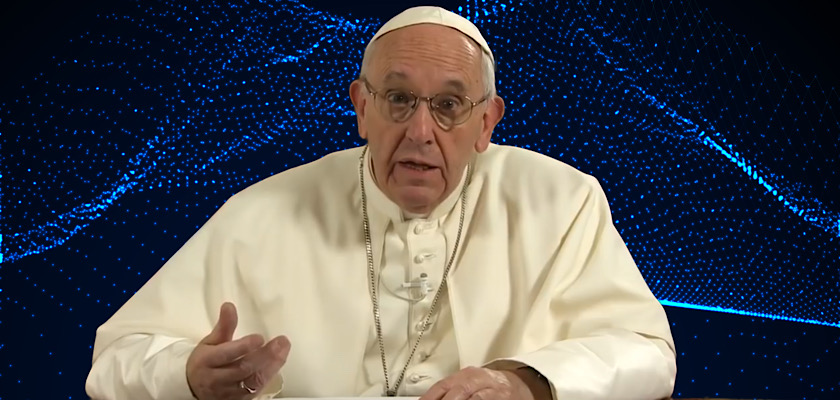During a meeting today at “The Common Good in the Digital Age”, a Vatican-sponsored conference, Pope Francis warned how an increasingly digital future poses various dangers to humanity.
Pope Francis issued his warning to an assembly of Silicon Valley CEOs, a Facebook lawyer, moral theologians, and a range of specialists from fields such as robotics, cybersecurity, and cyber warfare. He said that robot automation replacing human jobs and the potential of artificial intelligence (AI) to wreak havoc on democratic debates are some of the threats humanity faces as it moves towards an increasingly digital future:
“If mankind’s so-called technological progress were to become an enemy of the common good, this would lead to an unfortunate regression, to a form of barbarism dictated by the law of the strongest.”
The pope also spoke on the dangers of the internet being used to manipulate the flow of information. “It is possible, as never before, to circulate tendentious opinions and false data that could poison public debates,” the pope said. He added that this could endanger ”the very institutions that guarantee peaceful coexistence.”
The pope asked the attendees to find a “unifying ethical framework” which will help guide entrepreneurs, inventors, and venture capitalists in the tech sector.
The pope’s warning comes after other world leaders and public figures have also warned about the potential dangers that AI poses to the human race. Just a few days ago, British Prime Minister Boris Johnson warned of Google’s surveillance during a United Nations (UN) General Assembly meeting and said that smart tech is creating “some great cloud of data that lowers ever more oppressively over the human race.” And earlier this month, whistleblower Edward Snowden warned of AI tyrants that could become “automated police offers.”
Real-life examples of AI’s rapid development in the area of deepfakes (content created by AI) are also providing a chilling backdrop for the warnings related to AI manipulating the flow of information. At the start of this month, the Chinese deepfake face-swap app Zao went viral in China and showed how this technology can now superimpose people’s faces onto the characters from various movies and TV shows using just a single image. A deepfake audio simulator which accurately mimicked the voice of clinical psychologist Jordan Peterson and gained traction last month also showed how eerily accurate this technology is becoming in this audio space. These examples provide a window into a potential future where deepfakes that are indistinguishable from real audio or video could make it impossible to know what’s fake and what’s real.
Reports of Google using biased AI to manipulate search results to suit and reflect the company’s political bias in June also show how this technology is, as Pope Francis warned, often “dictated by the law of the strongest.”













